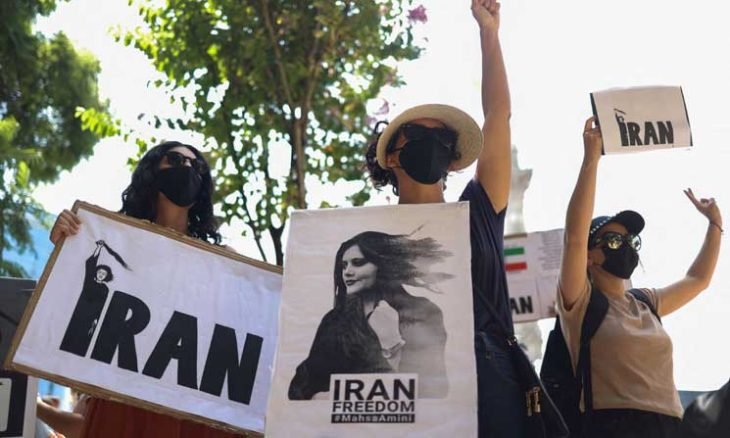With protests raging in Iran, Lebanese Hezbollah weighed in, with the Secretary General Hassan Nasrallah defending Iran’s policy. Regarding the death of Mahsa Amini, Nasrallah argued this mysterious occurrence was exploited to incite protests, and that some of those protesting were involved in vandalism and attacks. Hezbollah’s stance is noteworthy, as it did not express a similar stance regarding the protests of 2017 or 2019 in Iran. It may be taken as an indication that these protests are exerting significant pressures on the Iranian regime.
Hezbollah has a number of motivations to weigh in on the debate surrounding these latest protests in Iran, including:
Widespread international support for protesters: Hezbollah’s support of Iran’s official rhetoric comes in response to the widespread international interest in the protests, and the resulting violence as a result of the authorities’ crackdown. Thus, Hezbollah endorsed the regime’s references to foreign forces who are conspiring against Iran with the help of internal parties. The US and several other states have imposed sanctions on Iran’s so-called “guidance police”, who were accused of assaulting Kurdish Mahsa Amini in a manner that led to her death on 16 September. Some Western countries have also summoned Iranian ambassadors to diplomatically object to the authorities’ use of violence against protesters.
Regional condemnation of attacks on northern Iraq: Iran’s ballistic missile and drone attacks on northern Iraq, on 30 September, targeting sites allegedly belonging to armed Iranian Kurdish groups incited wide regional condemnation. The attacks were considered a violation of Iraqi sovereignty, and an attempt to draw attention away from Iran’s protests. Hezbollah supported Iran’s official narrative regarding these attacks, which suggests it endorses this military intervention , which according to Hezbollah, aims to protect Iran’s national security. This is the same stance Hezbollah takes regarding Iran’s intervention in Syria, supporting President Bashar al-Assad’s regime in the face of armed factions, which has played a key role in changing the balance of power in the regime’s favor.
Growing domestic resentment over funding regional militias: Hezbollah’s support of Iran’s policy of dealing with protests is strongly linked to protesters’ opposition to continued Iranian support for armed militias in the region, notably Hezbollah, which negatively impacts domestic conditions in their view. Some protesters feel this support is undermining the state’s ability to meet the living needs of Iranians themselves and exacerbates various crises that are progressively expanding in impact.
The focus on the Supreme Leader of the Republic: In their slogans, the protesters focused on the Supreme Leader of the Republic Ali Khamenei and his family, in particular his son Mojtaba. Not only did they chant the slogan “Death to the dictator”, but they also protested the system’s perceived intent to enable the latter to succeed his father in office. This is being done, according to the protestors, by strengthening Mojtaba’s position within decision-making circles and his relations with the military, especially the Revolutionary Guard. Indeed, Mojtaba has been working in his father’s office for years, and therefore has access to state affairs.
Such a campaign against the Supreme Leader Ali El Khamenei represents a “red line” for Hezbollah, which previously declared Khamenei to be its spiritual guide. Nasrallah’s focus on Khameni’s health situation is meant to respond to recent rumors, which Nasrallah links to attempts to “undermine the foundations of the Iranian regime”. Nasrallah clearly is seeking to minimize the real reasons behind the outpouring of protests in Iran, portraying protestors as the agents of “foreign agendas”, although they were triggered by the death of Mahsa Amini in the custody of the “Morality Police”, and were exacerbated by the repressive policy adopted by the authorities.
Prospects of a maritime agreement between Lebanon and Israel: Hezbollah’s statements regarding Iranian protests coincided with the first breakthrough in the maritime demarcation issue between Lebanon and Israel. The Speaker of the Lebanese House of Representatives Nabih Berri (with ties the Hezbollah) considered US mediator Amos Hochstien’s written proposal as a “draft agreement” between the two parties, adding that it “meets in principle Lebanese demands.”
In this context, Hezbollah may have wished to send a message to Iran that any agreement with Israel would not affect Hezbollah’s role in Iran’s regional policies, or its attitude towards Israel. Hence, Nabih Berri’s assertion that “Lebanon refuses to allow the maritime agreement to impact land border”, is meant to indicate there is a certain ceiling on the effects of any possible agreement to demarcate maritime borders between Lebanon and Israel.
Thus it may be argued that, in weighing in on the controversy regarding Iranian protests, Hezbollah is sending messages to opponents inside Lebanon, as well as to the regional and international forces concerned, to the effect that pressure on both the party and Iran will only prompt the strengthening of relations between them. Hezbollah may play more influential roles in the future, but that will ultimately depend on the outcomes of the nuclear negotiations, and the trajectories of escalation with Israel.


